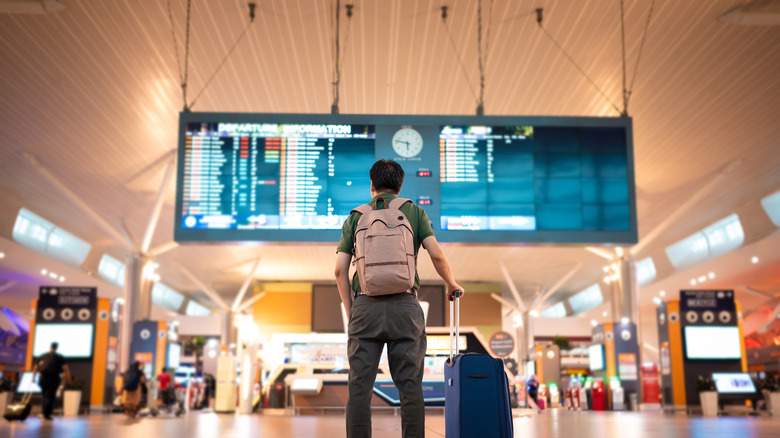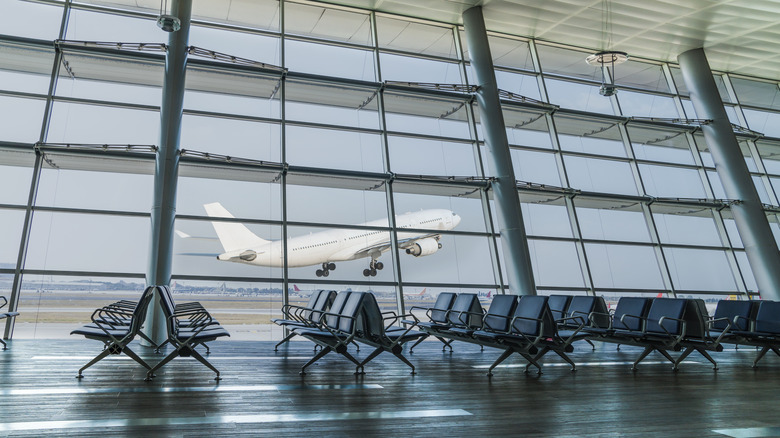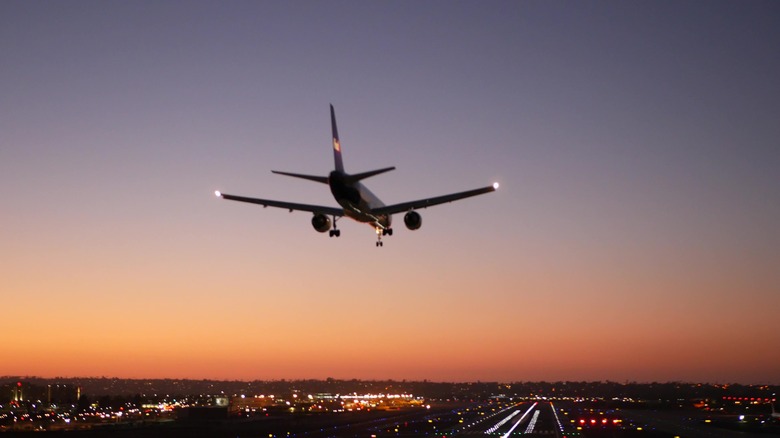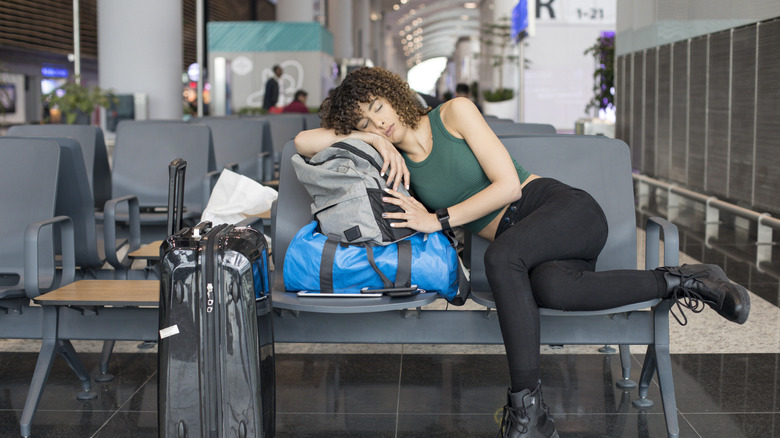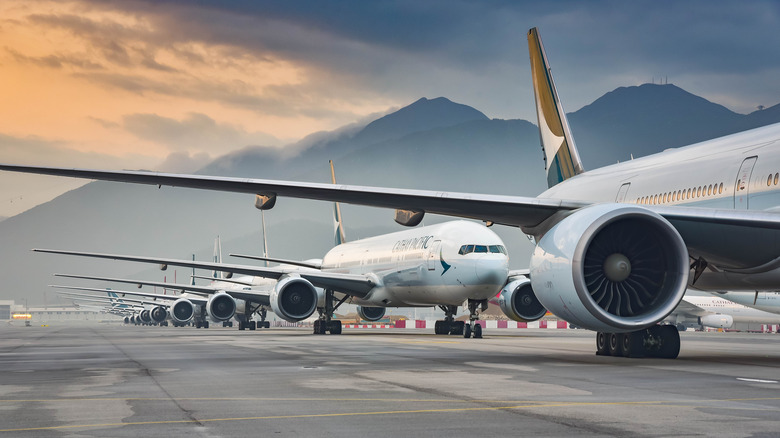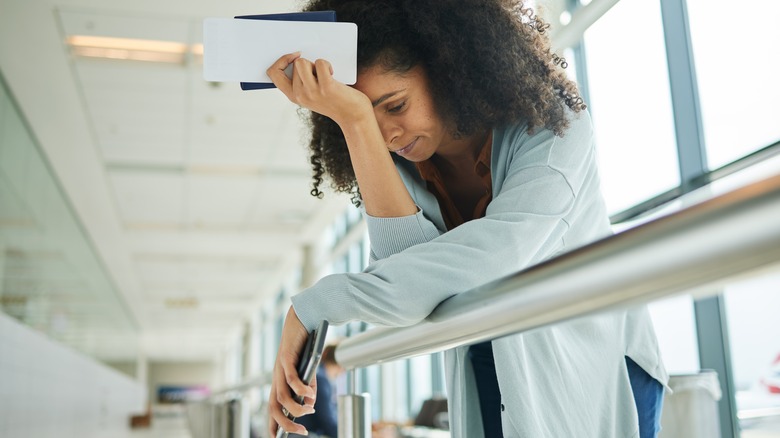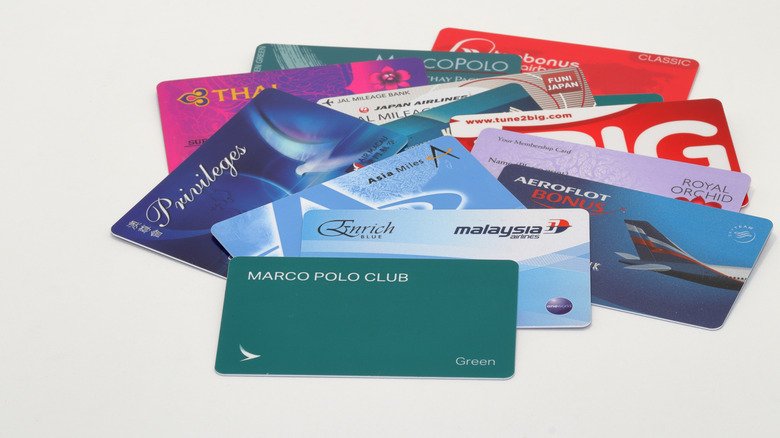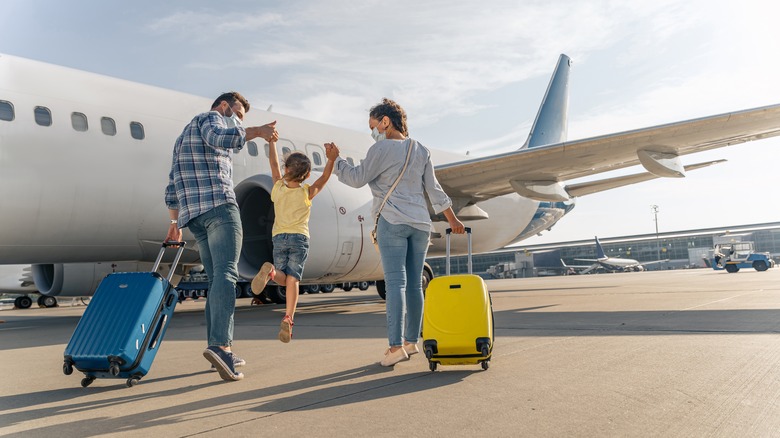Your Guide To Getting The Cheapest Flight For Any Trip
The pandemic shook the travel industry to its core, and we're going to feel those effects for years to come. Airports are pressed with fewer regular employees, pilots, and mechanics. There is also a shortage of air traffic controllers, which is leading to havoc on the tarmacs. Flights are getting delayed and canceled left and right, and airports (always a crowded place) are so packed these days that every day seems like a holiday. To add insult to injury, air ticket prices are so expensive that they're at times eclipsing inflation, which is rampant in the U.S. That revenge travel trip you were planning? Looks like the only one getting vengeance is the pandemic.
If ever there was a time when people desperately needed cheap tickets, it's now. Lucky for you, there are ways to bring fares down to levels that won't eviscerate your credit card. Ways that work to shave a few — and sometimes several hundred — dollars off a price regardless of where you're going, or when. Let's take a look at tips for getting the cheapest flight for any upcoming trip.
Book within the prime booking window
When you book your flight does matter, but a preponderance of travel booking myths leads people to lock down their dream vacation at the wrong times. Chances are you've been fed the following two lies about the travel industry for getting the best prices: One, you should book as early as the airline will let you; Two (if you like playing with fire), you should book at the absolute last second. Both are big no-nos. The former will cost you an extra $50 over a fare's lowest possible price, and the latter could cost you an extra $220, according to Investopedia.
In reality, there's a prime booking window during which most tickets hit their lowest-ever prices: between 46 and 164 days before your flight. Some disagree on this number; Google proposes that its actually between 21 and 60 days. This is when OTAs (online travel agencies, such as Expedia) and airlines drop their bargain deals and when prices rarely exceed 5% of a particular year's historic low. Granted, there is the occasional flash deal that falls outside the prime booking window, but we would recommend holding out hope on those unless you dare to go on a surprise-destination vacation.
Travel on a weekday
It's a common myth that buying your tickets on a Tuesday gets you the best deals. This, allegedly, used to be true. Back in the day, airlines would update fares so that the best deals appeared on Tuesdays and Wednesdays. Supposedly, this remained true right up until pre-pandemic days, but it's most certainly not the case any longer. Some days of the week result in better fares than others, but usually at random and only by 2% or less. Booking your trip to depart on weekdays, rather than booking a ticket on a particular weekday, makes a considerable impact on the cost.
According to CNET, airlines knap about 20% off their usual fares when you book a flight going out between Monday and Wednesday. Those aren't savings to scoff at when tickets could be costing you hundreds of dollars. Consider planning a mid-week mini vacay, or one that goes out and comes back during the first half of the week. You'll not only get cheaper flights, you'll swap out the weekend hordes of clueless tourists for better-behaved business travelers.
Fly red-eye
Red-eye flights are flights that head out late at night and arrive early in the morning, hence the "red eyes" from a lack of sleep onboard the aircraft. They're common when making a long haul across the pond to Europe or Asia, letting you arrive earlier in the day due to the time change. But they're unpopular (for obvious reasons) stateside and on shorter international trips. A lot of people can't sleep on airplanes, and if they can, they don't sleep well.
This tends to result in red-eye flights being less desirable, and thus significantly cheaper than daytime alternatives. If you don't mind the sleeplessness, or you sleep like a log no matter where you are, then grab a red-eye flight. You may not exactly arrive bright-eyed and bushy-tailed at your destination, but you will have a full day of vacationing on your hands. Then, there's the added bonus that airports are a lot less crowded at night with fewer flights going out. The only downside (apart from needing a steady stream of coffee to stay awake) is that airport restaurants and shops will likely be closed at this time.
Avoid nonstop flights
Layovers are sometimes an inevitable hurdle to experiencing the joy that is travel. Only a masochist salivates at the prospect of debarking from the plane halfway to their destination and repeating the nightmarish airport gauntlet — especially when that layover forces them to pass through security again. Nonstop flights spare you that misfortune. The only issue with nonstop flights is they can be more expensive, sometimes 20% more than flights with layovers. If cheap is your operative word, then you really should stick with layover flights.
It doesn't have to be all doom and gloom with layovers. Layovers present a great chance to stretch your legs off the plane and get some proper food in your belly. Many connecting airports are works of art and therefore destinations in and of themselves. Take Singapore's Jewel Changi with the largest indoor waterfall in the world and a gorgeous terrarium-like nature retreat. It's only one example of hundreds of incredible world airports worth seeing at least once. Just make sure to bring plenty of entertainment and a comfy neck pillow to endure the wait at airports along the way.
Take stopover or long layover flights
In an effort to be thrifty with travel, people have found increasingly clever ways to transform the cheapest options into desirable ones. A recent trend has seen people making stopovers — 24-hour layovers in a particular airport — into a way to see more places during the same journey. So, you might plan a stopover in Reykjavík for a day (or longer) before moving on to your final destination. Some airlines, such as Finnair and Japan Airlines, offer layover flights, plus their activities, free of charge.
Long layovers are another tactic you might try. Not to be confused with a stopover, a long layover is usually when you stay in the airport overnight. Folks dislike such flight bundles because you'd have to pay for extra accommodations, transport, and food, making them both a drag on savings and on time. That said, this can save you money if you're willing to sleep in the airport. It's not highly recommended since airport furniture sucks for sleeping and they sometimes close their secure areas (i.e. everything past security) at night. If you're a young, adventurous traveler, though, it might be worth it. Here are tips for surviving a long layover if you're willing to bite that particular bullet.
Try open-jaw flights
Open-jaw flights have a mildly disconcerting name, like a Frankenstein's monster of wicked dental surgery and the flying. The etymology is much more tame. This type of flight refers to the triangle shape your flight trajectory makes on the map, a shape that mimics an open jaw. More to the point, an open-jaw flight is when your return flight takes off from a different airport. For example, you fly from New York to Paris, take a land journey to Barcelona, then fly home from there.
This hack not only incentivizes you to travel to additional destinations, an open-jaw flight could save you money. The main reason is that fares across airlines and airports differ, so you can get cheaper one-way fares from two airports than if you'd done a round-trip fare out of the same one. You don't even necessarily have to find an airport in another city. Many cities have more than one airport that you can choose from — London, for example, has six. The only downside, apart from having to plan a journey that starts by one airport and ends near another, is that you'll have to do a ton of price comparisons to get a nice deal. Some OTAs give you the option to search out open-jaw flights, but most will force you to do so manually.
Use credit card rewards
Listen folks, credit cards are a quintessential part of traveling — period. Not because you should be racking up debt on unnecessary Amazon packages, but because you can effectively spin ordinary everyday purchases into gold. Travel-specific cards offer an eye-watering amount of miles for purchases you make, some as high as 10 times the amount per dollar. Those purchases can be anything that accepts your plastic, like groceries, utility bills, you name it. You accumulate miles over time and redeem them for expenses come time for vacation. The introductory offers (pay $4,000 and get tens of thousands of free miles) can "erase" entire flights and hotel stays from your statements.
Use your credit card provider's portal when booking flights to apply these rewards to your immediate purchases. Some providers will even give you bonus miles just for booking through them, allowing you to accumulate even more in the process. If you forgot to use your reward miles, it's not too late. Wait for the payment to finish pending on your statement and then redeem the purchase. It should work as long as your card provider recognizes it as a travel purchase. Most cards only give you a couple of months to redeem past purchases, so get on that if you've taken a recent trip.
Don't pay the extra fees
It seems like there's a fee for everything on airplanes these days. A fee for seat selection, baggage, travel interruption coverage, in-flight WiFi, the list goes on. It might not surprise us if one day they added one for using the bathrooms, or breathing. Airlines push these fees so aggressively that it gives the impression they're mandatory, when they're not. Take seat selection fees, for example. The booking platform tries to trick you into paying to select a seat, making you think you won't get one otherwise; Or, all the seat options come at a price. You have no obligation to choose your seat in advance. The airline will assign you one later, and may even give you the chance to choose one at the booking counter if they failed to sell it to someone else.
Consider cutting fees wherever you can. Skip the extra legroom seat on a short flight, since stretching your legs for a few hours may not be worth an extra hundred dollars. Go without an extra bag and be more economical with your existing luggage. Instead of buying the airline's pricey insurance, go with an insurance provider instead — it'll be cheaper and will cover a lot more than just a canceled flight. Ignore offers for special airport lounges or better in-flight meals; you can go without these things.
Compare all the prices
Most people go with their preferred OTA and take the lowest price they can get. You might assume that's the same price you'd find on other sites since they're all hawking the same fares, right? Well, not quite. OTAs often strike deals with the airlines whose flights they advertise, allowing them to negotiate extra-low discounts. As a result, one OTA with a particular airline partnership may be able to offer a fare price you literally would not find anywhere else. Taking that extra couple of minutes to search for a fare across multiple platforms could genuinely lead you to stumble upon a steal of a ticket.
As a matter of principle, check against every platform you possibly can. Try OTAs, flight aggregators like Google Flights, and follow travel bloggers who post about cheap flights they've found. Check at different times ahead of your flight in case a special flash deal pops up. There are modest savings to be had if you're willing to go through all this extra effort.
Use your airline points perks
Most people ignore airline perks. They're like those loyalty programs every retailer and grocer is trying to shove down your throat, and most seem like they're not worth the time or effort to sign up for them. This is true if you fly on a particular airline once a decade, but if you've taken more than a handful of flights with them, you could be missing out on some game-changing perks. Like credit cards, you accumulate literal miles every time you fly and those miles can be redeemed for rewards later on. The only limiting factor is that barebones economy flights don't usually qualify for miles, and miles expire after a few years of inactivity.
Sure, you'd have to be a very, very frequent flyer — as in, dozens of times per year — before you get those fabled free flights. But, the rest of the perks are worth the effort and could save you money for amenities that wouldn't be so cheap. Many lines give you free baggage, free seat selection, and free seat upgrades. If not, then they may let you redeem them for tickets to sporting events, Broadway shows, and free nights at resorts. It doesn't hurt to sign up and see what you're entitled to. At the very least, doing so saves your info in their system for future flights.
Try booking round-trip flights separately
Round-trip flights are preferable for convenience's sake since you can manage your entire trip from a single booking. In some select cases, though, they may not offer the best value. Consider booking a round-trip flight as two separate one-ways. There may be hidden savings for the taking. Plus, it makes it a lot easier when you need to cancel or modify one leg of your trip.
You'll definitely have to do a ton of experimentation to get the savings here, more than booking an open-jaw flight. The key is to be flexible with the days you fly out and return, and the airlines you fly with. This technique is less successful for domestic flights, unfortunately. Try it for international routes. In some cases, such as destinations in Asia and Africa, you could be seeing as much as 45% savings by booking separately, particularly if you aren't booking from the U.S. to another country. Globetrotters on a genuine world-spanning trip will benefit the most from this travel tip, but regardless of your plans, it really doesn't hurt to check just in case.
Make last-minute travel plans
Are you the sort of person who loves spontaneity, hates planning, and doesn't care where you go as long it gets you out of the house? Being this flexible comes with one-of-a-kind cost savings. There's been a surge in popularity in recent years for last-minute trips. That is, booking the cheapest ticket available right before your trip, no matter where it takes you. Airports do sometimes end up with a less-than-full flight and will sell off remaining seats for a steal.
Take note, this is a tactic that relies on a ton of luck. You could very well find a great ticket, only to arrive at a destination where the hotels cost an arm and a leg since you booked too late. You might arrive without a needed item, such as a swimsuit, forcing you to buy whichever overpriced option is available. The gamble doesn't always work in your favor, but if you're quick on the draw (and good at quickly cobbling together the right luggage) you can nab flights and accommodations for a good price in short order.
Whatever the case, we recommend this more for the spontaneity than the savings. Weekend warriors looking to get out of town, this is your time to shine. There's a special feeling going to a place with no plan and doing things entirely off the cuff. Just keep in mind that it does entail some risk that planning could have averted.
Purchase group tickets separately
Traveling as a group can be a pain, especially since many airlines don't provide fee-free family seating, according to the U.S. Department of Transportation. You're stuck sitting apart, or begging some other passenger to do a switcheroo. To make matters worse, as Rick Seaney notes on Investopedia, there's a known reservation system quirk that ends up making a group booking cost more than if you'd just booked tickets separately. To put it simply, booking platforms try to price-match all the tickets in a booking, so if there aren't enough tickets at a particular price, it bumps them all up to a costlier fare.
The solution is simple: book one at a time, provided all the individual tickets add up to less than if you'd booked them in bulk in a single go. Enlist the help of someone else to make this easier, and look at multiple single tickets versus one group ticket. Chances are, at least one of the individual tickets will be cheaper and thus bring down the total price. Book one at a time until the price goes up, after which you can book the remaining tickets under a single reservation. Take advantage of OTAs and airlines that let you hold a reservation for 24 hours, or those that offer a refund within the same window. This can prevent any unfortunate hiccups should you accidentally book the wrong fare.
Be on the lookout for special discounts
Senior and military discounts aren't just for getting 5% off your next meal at Golden Corral. Some airlines will let you cop a flight for 10% off if you're a veteran, senior citizen, or student. American Airlines, Delta, and United Airlines give senior discounts, but you will need to call their dedicated reservation hotlines. Air Canada, Alaska Airlines, Allegiant, and others offer a variety of reduced fares, free baggage, and other perks to service members both active and retired. OTAs like StudentUniverse give member-only pricing, provided you can verify that you're currently enrolled at a college or university.
There are some less-common discounts for individuals who serve our country beyond the confines of the military. Some sites claim to offer discounts for first responders, nurses, and teachers. Then there are "bereavement flights;" A handful of airlines like Alaska and Hawaiian will give you a 10% discount for one of your travel fares should you lose an immediate family member — although you will have the not-so-pleasant ordeal of having to prove that person passed away by providing detailed information within 10 to 60 days of your flight. Many of these discounts extend to hotels and car rentals, too. Whether or not you belong to one of these discounted groups, check the airline's website just in case to see if there's some benefit you can avail of.
